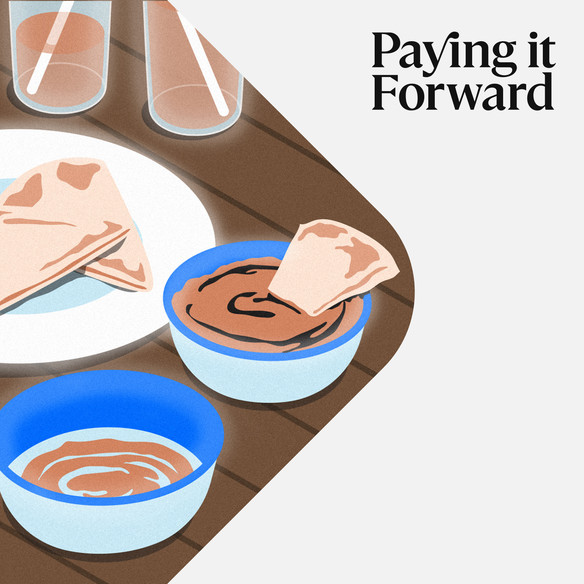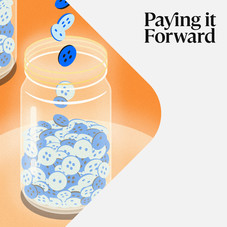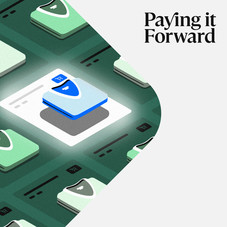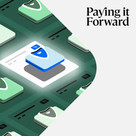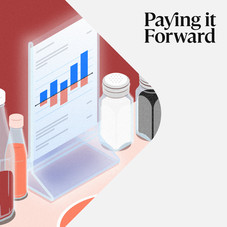Table of contents
“Coming from an immigrant background, I was not taught anything about debt. I had no idea what a credit score was. I had no idea what a business loan was. To be honest, I really didn’t know a lot of technical things when it comes to running a business,” says Bolani CEO Billal Sidiq.
Bolani Co, an Afghani bread business started by Sidiq’s mother, has weathered ups and downs after over 18 years in business. Today, he tries to pay forward the information he wished he’d known when he first started. “I try now to help people at the farmer’s market, a lot of small businesses come and talk to me and they’re just starting up. A lot of them from immigrant backgrounds who have no idea. And I tell them, look, go open a business credit card, build that up slowly because you’re going to need that credit later on. You might give a little bit now and in terms of an interest rate, but long-term, you’ll be able to gain more.” says Sidiq.
According to Stash Wealth founder and CEO, debt can be a tool that you can manage in order to support the growth of your business. “When you’re dealing with debt, you’re dealing with somebody else’s money that you’ve borrowed to use to invest in your business with the end goal of obviously growing, scaling, and increasing those profits.” she says, adding that there are things you can do to better manage that debt like negotiating more favorable terms or prioritizing principal payments over interest payments.
A little about this episode on managing debt…
In our penultimate episode of Paying it Forward, hear financial expert and Stash Wealth CEO Priya Malani explain the variables to consider when managing debt. You’ll then hear from small business owner Billal Sidiq, who has managed debt over the course of over 17 years in business.
When it comes to running a small business, tackling financial decisions can be daunting and often overwhelming. Each week, we’ll focus on a common financial issue bringing in an expert in the field with actionable insights and a fellow business owner who has tackled it first hand.
Guests
- Billal Sidiq, owner of Bolani, a family-owned, Afghani filled flatbread, dips, and sauce maker based in Concord, California
- Priya Malani, founder and CEO of Stash Wealth, a financial planning and investment management firm in New York, New York
Full transcript
You’re listening to Paying it Forward, a Square Podcast. When it comes to running a small business, tackling financial decisions can be daunting and often overwhelming. Each week we tackle one issue that could affect your business’ cash flow and hear from a fellow business owner experiencing it first hand.
On today’s episode, we look at what it means to manage debt. From checking your credit report to consolidating debt, small business owners are looking for opportunities to better manage their debt in order to reinvest and grow their business.
Priya: At the end of the day, debt is a tool that you can manage to support the growth of your business. Essentially, when you’re dealing with debt, you’re dealing with somebody else’s money that you’ve borrowed to use to invest in your business with the end goal of obviously growing, scaling, and increasing those profits.
That’s Priya Malani, founder and CEO of Stash Wealth, a financial planning and investment firm. She says that these are the two components you should keep in mind when taking on debt.
Priya: So just take a step back and talk about the mechanics behind debt. There are two specific parts that make up debt. There’s principal and there’s interest. Principal is the amount you’re borrowing. An interest is the cost to borrow that money. The higher the principal amount, the more you’re actually going to pay an interest. So if you can manage your debt in that, you start tackling the principal payments over time, you’ll pay less in your debt repayment.
When it comes to managing debt, there are ways to negotiate more favorable terms.
Priya: You don’t have to follow the timeline that was presented to you when you originally went into debt. When you originally struck that agreement to borrow money and to repay it, they set out a timeline. And the interest rate is obviously based on your credit score, but you don’t have to follow that timeline. You can be more aggressive, just like you can miss payments, you can also make extra payments. Now, one of the things that’s really, really important, and we talk about this with a lot of our clients who have student loan debt: When you go to make extra payments on your debt, oftentimes your lender will apply those extra payments towards interest, which actually doesn’t help you lower your overall payment at all. So what you have to do, you have to be active about this. You can’t just take a passive approach. You have to call your lender.
You have to tell them, “Hey, are there any prepayment penalties? I’m planning to make bigger payments on my debt to repay it sooner.” And if there aren’t any, tell them that as you make extra payments, you want it to be applied to principal. Because as I said, the larger the principal balance, the more you’ll pay an interest. So if they can reduce the principal balance with your extra payments, you’ll pay less overall. You absolutely can call everyone from your lenders on loans to your credit card companies. And you can negotiate better rates, better repayment terms. It’s negotiable.
If you’re not sure where to start when it comes to negotiating, pre-assess, try looking at debt with a high interest rate first.
Priya: Typically, credit card debt and business loan debt has the highest interest rate. So negotiating there will be the best bang for your buck. Now, if you feel like you’re not the best negotiator, typically what I would say is strengthen your case. Like when you have to go to negotiate, it’s not just about begging and pleading, it’s about proving that you are accountable, that you have been paying. That you’re on time with your payments. All the principals that make up a good credit score can also help you support a case to negotiate a better rate or better repayment terms, if that makes sense.
So I think at the end of the day, don’t focus on your negotiation skills. This is not the FBI or CIA. You just want to focus on being responsible with the debt you have outstanding. If everything’s everywhere, if you have payments in default, clean those up before you go to negotiate, strengthen your case, and then negotiate.
Our guest today is Billal Sidiq, CEO of Bolani, an Afghani flatbread and dips maker based in Concord, California. The company all started with Billal’s mom. As her flatbreads gained popularity, the company grew from selling to one farmer’s market to over 200. Operating this 18 year businesses had its ups and downs. So being vigilant about managing debt has been the key to growth for Bolani.
Billal: Bolani started in 2003 and it started in farmer’s markets. My mom used to work Monday through Friday, have her own job. And then on the weekends, she worked for other vendors at farmer’s markets. And then that’s how I got involved in it. I used to work farmer’s markets, so my mom would drop me off for other vendors at a different market. And we’d always come back on Sunday and we talk about how we did and how well the farmer’s market went and we talked about, we should start our own business in the farmer’s market because we see a lot of different types of foods.
Like there’s samosa, Indian food, tamales, empanadas, and there’s nothing really, like, Afghani. And my mom knows how to make really good Afghan filled flatbreads. So we just decided to take a chance and what the help of my dad, me and my mom, we started the business and we grew from one farmer’s market to two, to three, to eventually we grew to over 100 farmer’s markets a week. Primarily, that’s all we did was farmer’s markets.
And then in 2007, Whole Foods Forager Ventures’ Harvindar Singh, he reached out to us and he said, “Hey, I want to take you to Whole Foods.” And we had no idea what that was going to entail. And once started, we did so well, they started us in one store, two store, and then we grew throughout the Northern California region. And then we grew the business from Whole Foods to many other natural specialty stores and just on and on. And then we got large. And then my mom got sick in 2016 and I needed her to get away from the business. So we gave the company to a big conglomerate and then they ran things not the best way.
And it was just not a good fit. It wasn’t really them or us. It just wasn’t a fit. So we lost all our business. So in 2018, we got the company back and we started all over again. And now we’ve gone back through the farmer’s markets. We’ve gone now into natural specialty stores like Nugget, Mollie Stone’s. We’re starting rallies and Lucky’s so just building the business. So I’ve been through a lot of ups and a lot of downs.
Like what you heard on Paying it Forward?
Sign up for our newsletter to get more finance stories, delivered once a week.
Billal says that in those 18 years, managing debt was crucial to the business’s survival and key for reinvesting it into future growth.
Billal: That is so important. And I think so many young entrepreneurs, especially in the food business, which can be very up and down and takes a lot of money and capital to expand, especially in packaged goods, debt is very vital. Finding capital is very important and managing that is even more important. So for us, we’ve bootstrapped the company so many times where we didn’t take on investors, anything of that nature, we just use the farmer’s markets to grow the business internally. And we had so many ups and downs through that.
So I learned a lot and I think it’s something that people especially getting into the business is something that they don’t think about but you have to have that in line. I use Square at the farmer’s market and one of the debts that I have to count is the Square Loan. And I think that’s one of the unique things about Square as a processor, that it allows you, once you build that relationship, it just says, “Hey, do you need $50,000 or just get an email?” And I’ve actually used that. I’ve actually used $100,000 loan from Square and paid it off because they paid off through their processing.
So you don’t really feel it. It’s not like where every month I have to pay $1,000 back, it’s just pays it through my processing. And then in six months I get a letter that says, “Hey, you paid off your Square debt. Do you want $150,000 now?” And I think that’s a unique thing about Square. And that’s really helped me. Besides that, the other debts that I have taken on as SBA loans. I think those are also great ways for a small business to take it because the interest is so low, they’re really favorable. It’s really easy to get the loan. So I think those are the two avenues that I have taken on, reinvested, almost everything. So because we’re bootstrapping and we’re not taking on investors. One of the reasons we want to keep it in-house is because we’re a family business and we just want to grow like that. And we want to keep the integrity of the company. I don’t want people to sway my decisions when it comes to my employment or all the people that work for me like, oh, let’s just move to a co-packer.
I want to make everything myself. I want to use a local farms and new sustainable produce. And I just feel like I want to keep that control in-house. And one of the things by doing that, you have to constantly reinvest all the profits you make in, because if you don’t, it’s really hard to grow.
Billal says that he learned about the business the hard way. Their real life experiences as Bolani scaled in size.
Billal: Coming from an immigrant background, I was not taught anything about debt. I had no idea what a credit score was. I had no idea what a business loan was. To be honest, I really didn’t know a lot of technical things when it comes to running a business, I just learned the hard way, which was one day like, oh, we need money. Okay. We go to a bank. They’re like, oh, you don’t have credit. You don’t have this. You don’t have that. You don’t have assets. And it’s something that I just learned along the ways, but it’s so important.
And I try now to help people at the farmer’s market, a lot of small businesses come and talk to me and they’re just starting up. A lot of them from immigrant backgrounds who have no idea. And I tell them, look, go open a business credit card, build that up slowly because you’re going to need that credit later on. You might give a little bit now and in terms of an interest rate, but long-term, you’ll be able to gain more because Bolani went to a high and then fell. And then I started over, it allowed me to reset.
And I thought, okay, before we start to do all this production, we have to start building capital alongside the production. So we have to take on some debt. We have to be able to manage that debt because it’s easy to be like, oh, I’m just going to take on this big $800,000 loan, but you don’t have the income coming in to pay off that loan. So it’s really like a balance. You have to take on that $100,000 and then make sure you have the production and then pay that off. And then take on $300,000 and then pay that off. Can’t just be, you take on $300,000, you don’t pay it.
You take on $800,000 and you don’t pay it. And then it just becomes a snowball effect like that. So you really have to balance the two. I honestly just want to build a good business for my employees, for my staff, for my family, or whether that’s large or small, it doesn’t really matter to me as long as I can keep chipping away and produce good products where my customers can come and say, that’s delicious and you guys make good food and I can make enough to make a living. And I can make enough to pay my employees and acceptable wage and take care of them as we grow together, that’s more important to me than being in 1,000 stores.
You’re trying new ways to sell, making tough financial decisions, doing what it takes to make your business succeed. You aren’t alone. Join us on Square’s Talking Squarely podcast. We’re independent business owners just like you. Get real about the ups and downs of running a business, listen and subscribe to Talking Squarely.
Billal: When we started that nationwide shipping, it was to balance out that because farmer’s markets got so slow and we lost a lot of revenue and I was scrambling to try to figure out a way to not let go of my staff. So we started the nationwide shipping, which was very good for us, but I’ve also seen that, that has really tailored off because as people go back to the farmer’s market, they don’t order online as much. So we will definitely keep it as long as we meet a certain threshold. And then once it gets to a threshold and it’s not worth doing, but I don’t see it happening any time soon, unless the shipping really slows down where it’s not worth it to do.
And I think that’s every business owner has to make that decision, just like picking sustainable ways of produce and which suppliers to use. It’s such a balance act because in your heart, as an entrepreneur, you want to use the best of everything and the most, but you also want to balance that price point because you don’t want to make, in my case, a $15 Bolani where you price out. Sure, a lot of affluent communities would be able to afford it, but then there’s a lot of lower income communities that wouldn’t be able to afford it. And you want to balance those things.
Probably the most difficult thing about running a small business is managing your cashflow and predicting things. And then sometimes even if you predict curve balls, come in like, I mean, COVID-19 is a huge curveball for so many small businesses. I guess you keep managing to be honest, I don’t think there’s any answer I can give you that I particularly use. I just use my experience to be like, okay, the summer is coming. We got to put away this side for this, or we can spend more now or it’s the Winter, the farmer’s market slow down. So we have to go leaner now. And we don’t want to invest so much in social media or so forth.
Every business has a seasons and its ups and downs, and every business will know when to spend and when not to. But I think making critical spending when you are, do have extra cashflow is very important. So if you’re making extra cashflow and you can invest in your company, whether that might be machinery, automation, it might be investing in a new website design. I think those are very important. So it’s like preparing for a rainy day. But when you do those investments, it’ll pay off when things are slower.
When it comes to advice Billal would give to his younger self. If he could go back in time, 18 years, here’s what he would say.
Billal: When you’re building a business for me, it’s like when we grew too big, it was like we started off in a river and we had a boat for a river and we were really successful in that river. And when that river hit the bay, it was overwhelming. And it put a lot of stress on the boat. So we realized, okay, we’ve got to upgrade our boat. And we upgraded our boat and our boat got stronger and we moved into the ocean. And when we got to the ocean, the waves came in really big, and there was nowhere to really dock. You couldn’t stop anymore because the business got large.
So I always remind myself of that metaphor because it helps me remember wherever I’m going I have to have a boat equipped because as you go into deeper waters, there’s nowhere to dock the boat. So, as a young business, you really have to think about those things. And one of them is capital debt. How you’re going to structure a business equipment to do your business because you got to meet the demand and there’s no time to stop the show.
Thank you to Priya Malani and Billal Sidiq for their thoughts on managing debt. Priya Malani is founder and CEO of Stash Wealth, a financial planning and investment management firm. Billal Sidiq is CEO of Bolani. Find them on Facebook, as well as their site and Instagram at bolani.co. He says you can order them online or any grocery store as well as stop by one of their farmer’s market stands in the Bay area.
With Square Banking, your payments, business banking accounts and cashflow all sync together seamlessly. Watch your sales flow directly into your accounts. So accessing and moving your money is as fast, easy, and can even be automated. Sell, save, spend, and borrow as fast as you need to. To learn more, check out, squareup.com/banking.
You’ve been listening to Paying it Forward, a Square production. This episode was produced by Deborah Findling, Camille Kail, and Clara Shannon. Our music was composed by Jordain Wallace with sound recording by Sorrentino Media and D.R. Baker. Thanks for listening.
Square, Inc. is a financial services company, not a bank. All loans are issued by Square Financial Services, Inc., a Utah-chartered Industrial Bank, Member FDIC located in Salt Lake City, Utah. A minimum payment of one 18th of the initial loan balance is required every 60 days and full loan repayment is required within 18 months. Actual fee depends upon payment card processing history, loan amount, and other eligibility factors. Loan eligibility is not guaranteed. All loans are subject to credit approval.
![]()

